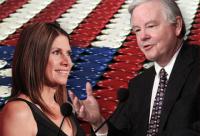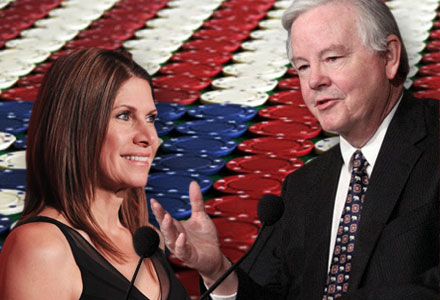 Poker got the focus of a Congressional subcommittee hearing this week for the first time in quite a while. Rep. Mary Bono Mack (R-CA) chaired a rambling two-hour meeting of the House Energy & Commerce Committee’s Subcomittee on Commerce, Manufacturing and Trade that focused on a bill proposed by Rep. Joe Barton (R-TX) that would establish a legal and regulatory framework for online gambling…and I watched it so you don’t have to.
Poker got the focus of a Congressional subcommittee hearing this week for the first time in quite a while. Rep. Mary Bono Mack (R-CA) chaired a rambling two-hour meeting of the House Energy & Commerce Committee’s Subcomittee on Commerce, Manufacturing and Trade that focused on a bill proposed by Rep. Joe Barton (R-TX) that would establish a legal and regulatory framework for online gambling…and I watched it so you don’t have to.
Some of the subcommittee’s members opted to give opening statements, including Rep. Barton, who told the subcommittee that he learned to play poker in the Boy Scouts so it has to be okay; Rep. G.K. Butterfield (D-NC), who is very concerned about minority children gambling; and Rep. Brett Guthrie (R-KY), who wonders if anyone will think of the horse-racing industry. From there they heard opening statements from a panel representing a narrow range of interests, including Sen. Alfonse D’Amato of the Poker Players Alliance; Parry Aftab of FairPlay USA, which is worried about the children; Ernest Stevens of the National Indian Gaming Association, which supports Indian sovereignty on gaming issues and opposes the Barton bill; Keith Whyte of the National Council on Problem Gambling, which sees gambling as a public health issue and wants money from it to benefit treatment programs; Professor Kurt Eggert of Chapman University law school, who spins fantastic tales of super poker robots that will fleece players unless there is government intervention; and Dan Romer of the Adolescent Institute at the Annenberg Public Policy Center, which wants money to research the effects of internet gambling on kids and problem gamblers.
– Rep. Bono Mack opened the questioning, Keith Whyte told her nobody really knows what kind of self-limitation schemes or credit limits will work to stop problem gamblers online, but that we can make something work. Then Ernest Stevens told her that the reason Indian tribes who currently operate casinos should be granted a period of exclusivity in the opening of any online market (and that Indian regulators shouldn’t have to submit to any other regulations) is because the tribes are sovereign entities who have been screwed over more than a time or two by the good old US government and none of them are planning to give up any ground they gained on the gaming issue, since it provides badly needed social services for their communities. Also, Indian tribes have lots and lots of practical experience regulating gambling.
– Rep. Butterfield of North Carolina is very concerned with how minority children spend their time online and he wanted Dan Romer to tell him how to write the law so as to make them more interested in school activities than gambling when they’re online. Romer replied that he didn’t think a law could be written to do that. Keith Whyte then jumped in to suggest culture-specific health services for problem gamblers before Chariman Bono Mack reminded everyone to respect the five-minute time limit for question-and-answer time.
– Rep. Charlie Bass (R-NH) asked Sen. D’Amato if the PPA would be opposed to lotteries operating online as competition to poker sites. Sen. D’Amato replied that the PPA would have no problem with that because poker and lotteries don’t share the same customers, so there’s really no competition between them.
– Rep. Edolphus Towns (D-NY) was very impressed by just how much money the government could make from legalizing online poker, because the government could spend it on entitlement programs. But he didn’t get why the Indians oppose changes to current law. Mr. Stevens explained the whole thing about Indians getting screwed over by the white man again. Rep. Towns concluded that some people will overdo it with gambling, but some people will overdo it with just about everything; therefore we should use the money from poker to take care of those people.
– Rep. Barton introduced a letter from the American Gaming Association’s Frank Fahrenkopf to the record before asking Mr. Stevens why Indians want to be treated different. Mr. Stevens, displaying great patience, once again reiterated that the tribes want to be recognized by the law as sovereign entities. Rep. Barton then offered up the facts that he plays poker in an Oklahoma Indian casino and that he is “1/32nd Cherokee” as proof that he’s “with” the Indians on gaming, before telling Professor Eggert to just draw up some language banning bots and he’ll throw it into the bill
– Rep. Leonard Lance (R-NJ) entered a letter from FairPlay USA’s Louis Freeh into the record before asking Mr. Stevens once again why Indians want to be all special and regulate themselves. Mr. Stevens reiterated his earlier point about their vast experience in the realm of regulating gambling within the United States.
– Rep. Gregg Harper (R-MS) is very scared by online gambling. He wanted to know who has accepted money from offshore gambling sites; the PPA and the National Council on Problem Gambling both have. Rep. Harper called Full Tilt a Ponzi scheme and tried to pin it on Sen. D’Amato, who showed his chops by turning it around and saying the only way to avoid situations like Full Tilt’s is by legalizing and regulating.
– Rep. Marsha Blackburn (R-TN) wanted to know whether the panelists thought brick-and-mortar casino regulations should extend to the online realm. Mr. Stevens said the tribes consider online and brick-and-mortar two totally different types of gambling; Sen. D’Amato, Ms. Aftab, and Mr. Whyte wanted to more extensive regulations; Professor Eggert is scared of bots; and Mr. Romer wants more warnings and reminders for gamblers online.
– Rep. Cliff Stearns (R-FL) had the most entertaining five minutes of Q&A, which started by asking Mr. Whyte about the availability of specific games online in Europe. Blackjack? Roulette? Slots? Poker? Then he asked Ms. Aftab how we can stop kids from gambling online when they get their hands on porn so easily just by clicking a link that says they’re 18. Then he wanted to know if you can use your Blackberry to gamble online in Nevada and asked Mr. Whyte to explain it to him, but Mr. Whyte demurred as he is not an expert on such things.
– Rep. Bill Cassidy (R-LA), a doctor, was really impressed by Professor Eggert’s assertions that bots rule online poker and are coming to crush all the humans. Professor Eggert agreed that the bots are unstoppable. Rep. Cassidy opined that if he designed a “superbot” he’d make it win only 90 percent of the time, maybe making it fold a full house sometimes so nobody would know it was such a super bot. Then Ms. Aftab volunteered that not only could we prevent people from using bots by tying people’s identity verification into homeland security databases, we wouldn’t even need new legislation to do it – we could just put it in the privacy policy for every online poker site.
– Rep. Bono then asked Sen. D’Amato if the PPA opposes the Indian tribes’ demands. Sen. D’Amato said they should be able to compete with everyone else. Then he took the opportunity to make a few comparisons between the current law and the miserable failure of Prohibition, finishing off by telling people who are worried about protecting the children that what America needs in that regard is some good old-fashioned parental responsibility.
– Rep. Butterfield of North Carolina is very concerned about poker games being “infiltrated by professional players” and asked Professor Eggert how to stop that. The professor restated how scary and unstoppable bots are before suggesting the implementation a rating system for poker like there is in chess.
– Rep. Barton then let everyone know that he was getting hungry and mentioned how esoteric everything was getting for a preliminary hearing. Also, he has 15 million dollars in play money online but has never played online for real money, and you have to be an idiot to sit down for high stakes if you don’t know what you’re doing. He then asked Professor Eggert whether the chance that someone might use a bot is really a reason not to legalize and regulate poker, and Professor Eggert said he did think so because computers are good at chess. Then Rep. Barton laid down the smack, informing the professor that the skills used to deal with imperfect knowledge in poker make poker make it much harder for a computer to beat than chess.
– Rep. Adam Kinzinger (R-IL) apparently hasn’t done any reading on this subject, so he asked Ms. Aftab to spend his five minutes telling him the basics of online gambling around the world. Ms. Aftab was happy to oblige and along the way opined that unregulated sites could be run by “terrorist organizations, underworld criminals, or people out of their garages” – you just never know online! – and that “anything that can go wrong does go wrong” on unregulated sites.
– Rep. Harper of Mississippi got all passive-aggressive again and asked everyone whether they think Congress should blacklist companies that currently operate in America right now. He bullied everyone into saying yes except Sen. D’Amato, who fired back by pointing out that the DOJ’s dependence on the Wire Act to ban online gambling isn’t a matter of settled law. Then Ms. Aftab volunteered that if we just use biometrics when people sign on, we can guarantee there are no kids playing poker online.
Chairman Bono Mack adjourned the hearing after pledging to examine a wide range of issues related to online gambling and to do what’s best for American consumers. There was lots of putting the horse before the buggy in this one – hopefully the chairman will consider adding some other voices to the conversation when she convenes the subcommittee for a second hearing to continue exploring online gambling.
